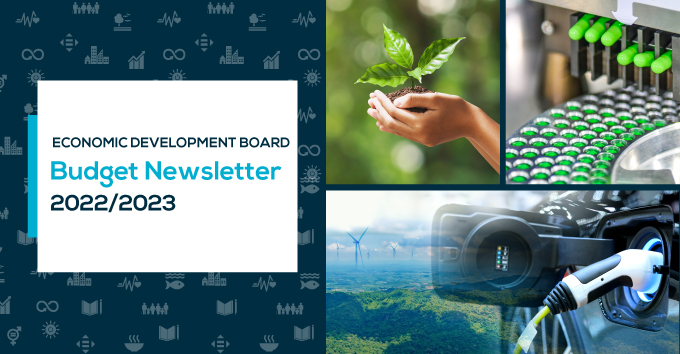Click here if you are having trouble viewing this message.
 |
|
CEO's Message |
|
|
|
The Budget, titled With the People, For the People, has been read in a particularly unpredictable global economic context. We are currently in an atypical period in world history, fraught by a persisting inability to predict events in uncertain contexts. The post covid recovery has been blighted by additional difficulties following the conflict between Russia and Ukraine. Russia and Ukraine together account for more than 55 percent of global exports for sunflower oil, 30 percent for steel and 20 percent for wheat. The war has inexorably affected world supply and causing a surge in energy and food prices. The IMF expects inflation to rise to 5.7 percent in advanced economies, a 38-year high, while in developing and sub-Saharan countries it is forecasted at 8.7 percent and 12.2 percent, respectively. This situation has led the IMF to recently revise the global growth forecast for 2022 to 3.6 percent, 0.8 percentage points lower than initially estimated. Mauritius has been caught in this crossfire with our progress stunted by the volatile change in the dynamics of the commodities markets and this is a crisis with no end yet in sight. The measures announced in the budget represent a response that places people at the centre of the strategy, while remaining responsible, recognising that it would serve no purpose to put in peril the future with reactive and disproportionate policies. The concerns of the most vulnerable, while remaining conscious of the fiscal burden and the need for higher levels of growth, have been firmly addressed. Public debt is expected to fall below 80 percent of GDP this financial year, fuelled by carefully planned government expenditure and higher GDP growth rate, particularly, in the tourism sector where more than one million tourists are expected for FY 2022/23. The budget deficit of 4 percent also reflects the prudent approach of Government, putting all the means to ensure a strong recovery. GDP growth for FY 2022/23 is expected to be 8.5 percent. Economic independence and sustainability are core tenets of this budget. With the measures announced with regards to promoting self-sustainability in the agro-industrial and energy sectors, this budget aims at being more efficient and going beyond our current production possibility frontier by making the most of our resources. As announced, the Green Transformation Package is expected to contribute an additional 200 MW of electricity by 2025, which will bring our renewable energy production to 40 percent achieving two-thirds of our target of 60 percent. Production of energy through hybrid renewable sources, electrification of the vehicle fleet, energy demand management and the transition towards a carbon neutral manufacturing sector are key measures identified in the pursuit of this objective. In the agro-industrial sector, the Government has earmarked Rs 3 billion to boost local production in the vegetables, fruits, sugar, honey, livestock and fish segments. To alleviate the rising costs of inputs of farmers, a subsidy on fertilizers and seeds is introduced, while the guaranteed price on certain staples such as onion, potatoes and beans will offer much needed comfort to growers. The Integrated Modern Agricultural Morcellement Scheme will also encourage large scale agricultural projects. Other measures aim at promoting agricultural practices in line with the overarching principle of sustainability. These measures will have significant benefits on the overall economy by reducing imports and protecting citizens from high volatility in food prices. On the sectoral aspect, several proposals have been announced, building on the previous budget. The single regime in the financial services sector is a landmark announcement as Mauritius continues its progress to become an international financial center of substance, fully compliant to international norms. The provision for a top-up tax on GBCs also sends the right signal in this direction. In the manufacturing sector, the regional feeder vessels announced will be a key enabler to provide the business community with the means to connect to markets regionally and well as Asia amidst rising global freight cost. Following the tremendous effort made to bring Mauritius to the 13th place in the last World Bank’s Doing Business Report, a new series of reform is being canvassed, notably the regulatory review exercise in the tourism, logistics, healthcare and construction sectors. Key measures include reducing delays in opening bank account and waiving incorporation fees. These will further position Mauritius as a destination of choice for doing business. Employment creation features high on the agenda as well. The ‘Prime à l’Emploi’ measure will significantly reduce unemployment by targeting the youth and women, who are mostly affected. The EDB is once again called to deliver on a range of key schemes including the recently launched Digital Industries Academy, which will be transformed into an incubator in order to foster skills development in the digital sector. The EDB will also look after the newly announced Sustainable City Scheme and Transit Oriented Scheme, which will accelerate community-based development on sustainable mixed use projects across the island. Finally, budget 2022/23 addresses the key issues of erosion of purchasing power of households. The monthly CSG retirement benefit of Rs 1,000 for the above 65 years old, the Rs 1,000 increase in pensions for the over 60 years old, the ‘Prime à l’emploi’, the increased supports under social aid and SRM and the reduced income tax rate for individuals earning less than Rs 50,000, will boost the disposable income of individuals in the lower income bracket to help with the rise in cost of living. In light of the measures announced to improve the standard of living, EDB is including a dedicated section on social measures in this newsletter. In addition, this newsletter will provide you with an overview of the main economic measures of the budget, as well as an in-depth analysis of the associated economic impact. I wish you a pleasant read. Ken Poonoosamy |
| Back |
|

